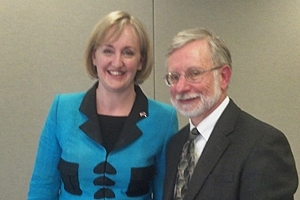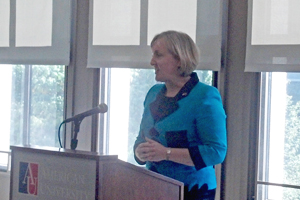On Campus
New Zealand Environmental Minister: "Water is the New Oil"

New Zealand's Minister of Environment Amy Adams, left, and Center for Environmental Policy Director Daniel Fiorino
On Friday, September 6, the Honorable Amy Adams, the Minister of Environment of New Zealand, spoke to students and faculty from the School of Public Affairs and across the university. Adams has served in Parliament since 2008 and is a member of the National Party.
Adams shared her perspectives on managing New Zealand's natural resources and explained that the national economy is highly dependent upon its natural resources for tourism and agricultural exports, which account for two thirds of the national economy. In addition, Kiwis’ national identity is inextricably linked to New Zealand’s natural environment.
"Water is the new oil," claimed Adams as she described the management of fresh water in water-scarce catchments (watersheds). For each 1 percent increase in water efficiency, $12 million is contributed to the economy in terms of food and agricultural production, recreation and tourism, she explained. Adams highlighted the historical pollution of aquifers, which is attributable to diffuse land-based or non-point source pollution. She identified that a management shift is necessary to improve water quality, which will require that central government provide greater guidance to regional councils. Adams explained that indigenous Maori have a deep connection to water and the central government has an obligation to protect and engage the Maori in discussions about water and all natural resources.

Adams described the innovative Green Growth Advisory Group, an experiment in collaborative environmental governance with a focus on creating a more competitive economy based on environmental assets and principles. Among its many responsibilities, this group was tasked with measuring and reporting environmental data to ensure transparency and to help make environmental information understandable to the public. In fact, mandatory environmental reporting is being implemented later this year as a result of the Advisory Group’s recommendations, which will increase the frequency of data collected and the quality of data produced. After all, according to Adams, “we won’t manage unless we measure.”
Finally, Adams highlighted the ways in which New Zealand is leading the world in addressing climate change by phasing out fossil fuel subsidies and removing disincentives for renewable energy. Half of all of New Zealand’s greenhouse gas emissions are from the agricultural sector and New Zealand has spearheaded the Global Research Alliance on Agricultural Greenhouse Gases to spur innovation and international cooperation on reducing the climate change impacts of agriculture.

